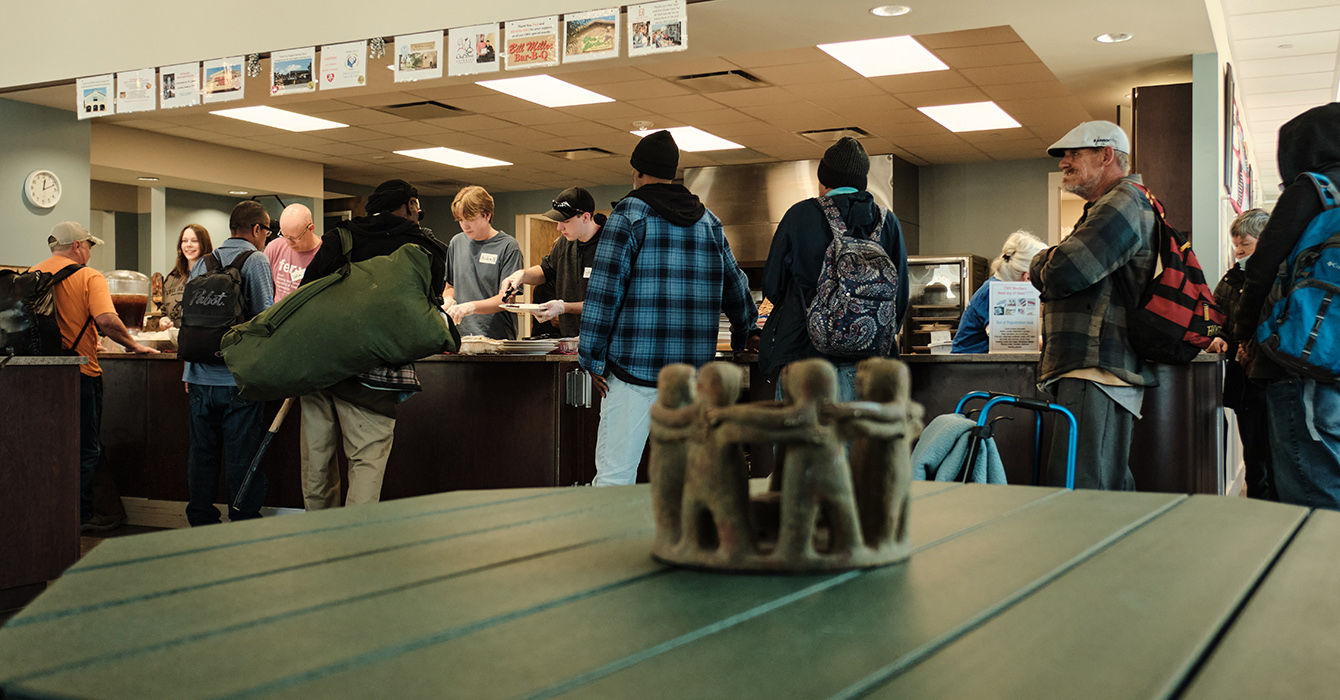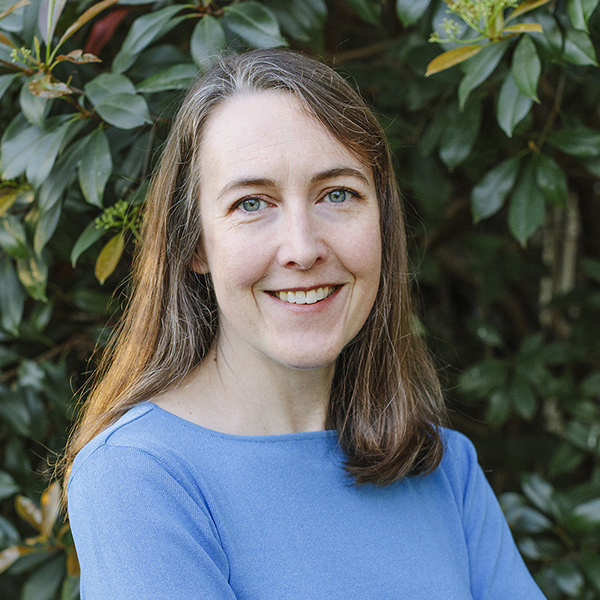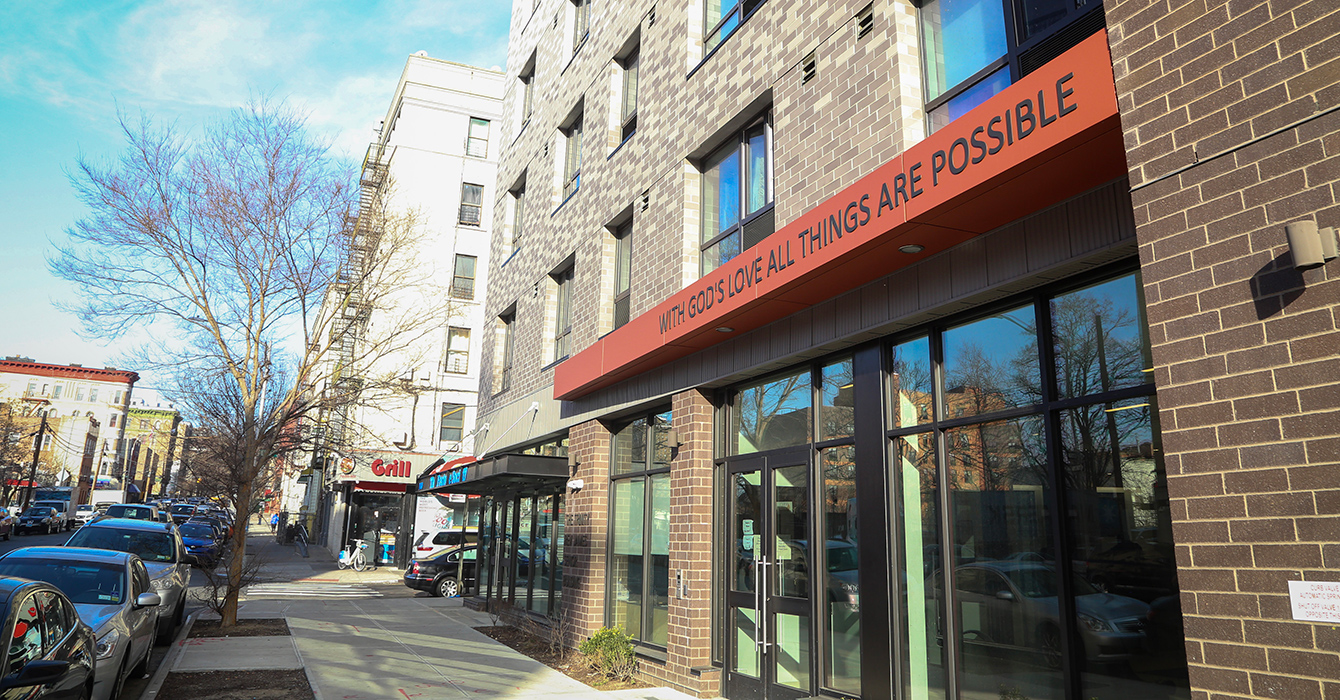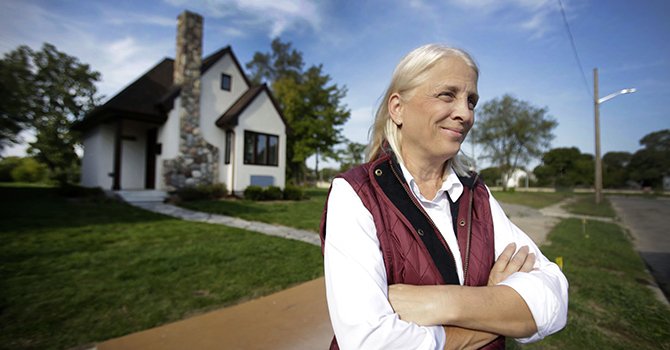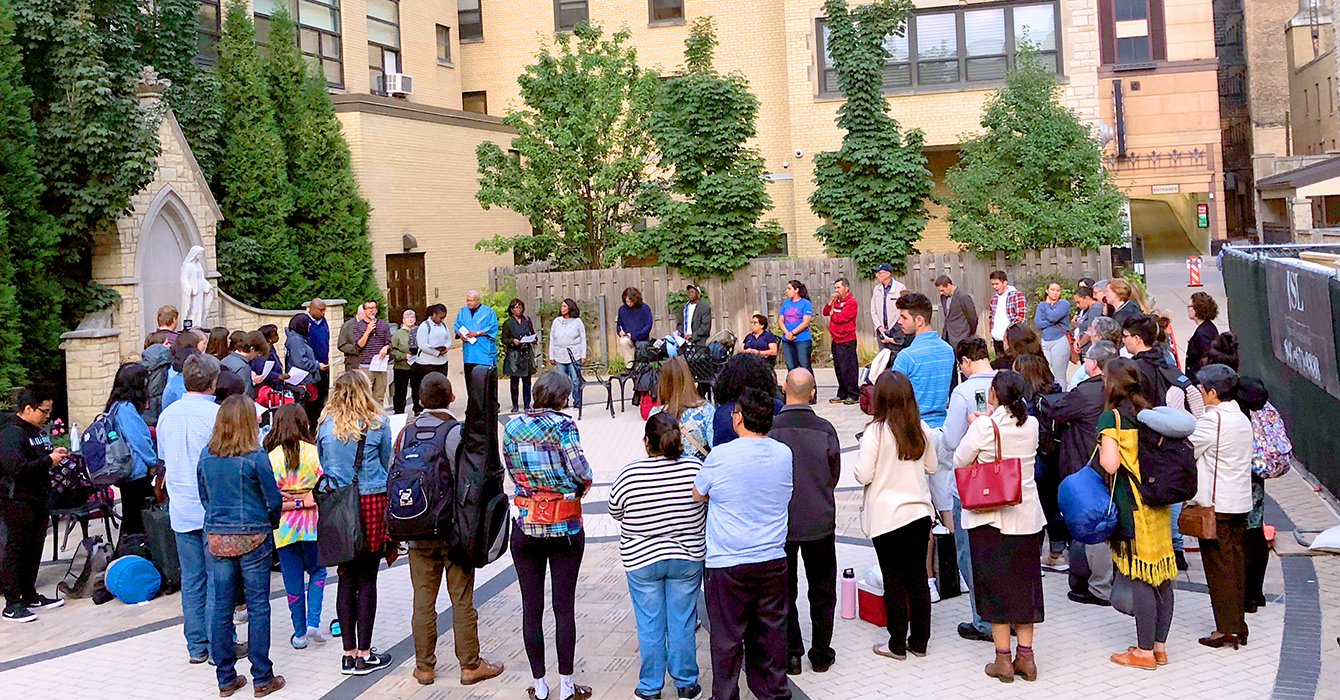On a warm January day in San Antonio, guests are still trickling into the Dorothy Day House of Hospitality at the end of the lunch hour. Chris Plauche smiles and greets them by name as she hands them plates of barbecue and green beans donated by a local restaurant.
A half dozen guests are scattered among picnic tables in the dining room, where light spills through oversize windows and glints off the wood floor. Some of them arrived in the morning by city bus. Others walked from the tiny homes where they now live, yards from the dining room.
Plauche arrived at 7:45 a.m. to help a volunteer warm food and make coffee. But she’s been awake since 2 a.m., the hour she rises each day to pray, answer email, attend daily Mass and take a 3-mile meditative walk before her shift in the kitchen.
The 76-year-old retired pediatrician has for nearly 20 years been the driving force behind the local Catholic Worker movement.

For nearly four decades, San Antonio’s Catholic Worker volunteers helped the city’s poorest and most vulnerable residents primarily by serving meals at a house in a residential neighborhood.
But in 2021, they broke ground on an ambitious project Plauche had imagined for years: a permanent supportive housing community with more than 200 residences for formerly homeless senior adults, the first development of its kind in San Antonio.
Building homes was a radical change from serving food, and the learning curve was so steep that Plauche turned for help to Edward Gonzales, a veteran administrator in San Antonio’s city government.

Despite meeting under dubious circumstances — he had been dispatched by the city five years earlier to shut down the original Catholic Worker house — the two formed a strong partnership.
The combination of Plauche’s fidelity to the Catholic Worker mission and Gonzales’ experience managing logistics has made the pioneering project a success. She considers the lilies of the field; he considers legal liability, grant documentation and succession planning.
“That’s the yin and yang between Chris and I,” Gonzales said. “We ultimately have the same heart and goal. We just have different approaches.”
Surrendering to God’s will
Plauche began volunteering with Catholic Worker because of a debilitating case of writer’s block. In 2005, while a professor at the University of Texas Health Science Center at San Antonio, she agreed to contribute a chapter about autism, her area of expertise, to a textbook for pediatricians. But she couldn’t figure out how to begin.
She made a deal with God: Help me get started and I’ll devote 20 hours a week to whatever ministry you want.
That night, she dreamed about a homeless person; the next day, her spiritual adviser gave her a book about Dorothy Day, who co-founded the Catholic Worker movement; not long afterward, Plauche took a wrong turn driving through downtown and ended up at an encampment of unhoused people under a bridge.
To Plauche, the three encounters qualified as “sacred synchronicities.” But she didn’t know anything about working with people experiencing homelessness. She had never heard of Dorothy Day — at first, she thought the book was about actor and singer Doris Day — but the more she learned, the more Day’s mission resonated with her.
In 1933, Day and others had launched the Catholic Worker newspaper in New York City to cover the church’s social teachings and pacifism. Day also established “houses of hospitality” to offer shelter to people in need of it, without requiring anything in return. Today, around 200 such houses operate around the world.
To fulfill God’s assignment to work with people experiencing homelessness, Plauche started volunteering at San Antonio’s Dorothy Day House of Hospitality. She soon became the ministry’s leader. It was then located in a house in a dilapidated neighborhood just east of downtown. The house sheltered a few families and provided meals and a place for daytime guests to relax.

“It was just a good place to get off the street for a little while and sit down somewhere where nobody wanted to run you off,” said Robert Pierce, a guest and Day House volunteer. Now 58, Pierce spent about 17 months on the street after losing his job in the service industry. At the Day House, he helped by making coffee and washing dishes alongside Plauche.
A native of southwest Louisiana, Plauche had attended Catholic schools and obtained her driver’s license early for the express purpose of going to daily Mass. During college, at St. Edward’s University in Austin, she had tried on life in a convent but later married, had a daughter and worked in pediatric medicine.
When she began volunteering at the Day House, Plauche realized she had never consciously surrendered to God’s will. Accepting God’s call to work with unhoused people marked a turning point in her life.
Since that time, she said, “it’s not my plans at all; it’s whatever God wants me to do.”

By 2016, though, the Day House had come under scrutiny by the city and by its neighbors, many of whom had moved into new homes built on lots that had doubled in value over the past decade. These new arrivals’ patience with the guests at the Day House — sometimes 100 per day — had worn thin.
That year, city leaders decided to close the Day House and asked Gonzales, then the assistant director of the department that oversaw programs for the city’s unhoused population, to help the guests find other resources.
Gonzales urged his colleagues to delay the closure so he could visit the house first.
“I was just blown away by the work that her small organization was doing for so many people that was so much better than the quality of work of other nonprofits we were funding with lots of money,” he said.
He told his colleagues he couldn’t approve an immediate closure. Instead, he worked out a compromise with the neighbors but urged Catholic Worker to relocate as soon as possible.
A new financial strategy
Plauche and the Catholic Worker board decided that if they had to move, it should be to a place that could offer housing. This, they thought, was the only long-term solution to their guests’ challenges.
The need was great. In 2016, San Antonio’s point-in-time count identified 2,781 people experiencing homelessness, 40% of them unsheltered. (In 2024, the number had risen to 3,372, but with a smaller percentage unsheltered.)
After retiring from medicine in 2007, Plauche had enrolled in the Master of Arts in Spirituality program at San Antonio's Oblate School of Theology. For a class project, she had researched homeless housing strategies and discovered the Housing First model, which emphasizes offering people permanent housing as soon as possible, without first requiring that they be sober, have a job or meet other conditions.

The philosophy was “so different from everything I had known about,” Plauche said. “I love the idea of meeting people where they are.”
The board realized it needed a new financial strategy. The Catholic Worker philosophy opposed fundraising, urging members to trust God that donations would come — and at the Day House, they always did.
But buying land was different.
“We were in a whole other budget world and felt like we needed to pull people together who would have a heart for this but who might have some connections or ideas on how we could raise the money we needed,” said Mark Wittig, a Catholic Worker board member.
Wittig, a civic leader who retired from the office furniture business, had supported the Day House financially since its launch in 1985. In 2017, Plauche, Wittig and colleagues formed a new nonprofit, the Housing First Community Coalition (HFCC), with Wittig as president.
Two years later, the group found its new home: a long-defunct two-screen drive-in movie theater called the Towne Twin. The site is a 15-minute drive from the old house — farther from downtown — in a neighborhood of single-family homes, apartments and industry.
HFCC purchased the property for just under $1 million contributed by board members, later supplemented by a donation from the Sisters of the Holy Spirit and Mary Immaculate. It decided to call the housing project Towne Twin Village.
At the groundbreaking in May 2021, Plauche stood before a crowd that included the mayor and other dignitaries. Behind her was a giant cardboard check representing Bexar County’s $4 million contribution, which followed one from the city for $5.4 million.
As she prepared to speak, Plauche was distinctly uncomfortable. “You would think I would be elated,” she said. Instead, she was beginning to panic. Plauche was serving as executive director of both Catholic Worker and HFCC.
Catholic Worker had no paid staff, no mortgage, and a budget of $60,000. But Plauche was now responsible for hiring contractors and meeting code on an $11 million construction project. This is way over the number of zeroes I can handle, she thought. Dear God, you’ll have to find somebody else.
The Housing First model offers housing without requiring recipients to change first. Are there other ways you could apply the principle of meeting people where they are?

As she scanned the crowd, she spotted Gonzales, now a leader in the city’s affordable housing department. After the event, she approached him to ask when he planned to retire from the city. “In three months,” he told her, a twinkle in his eye.
When he left the city after two decades of service, she and fellow board members offered him the job of executive director of HFCC. In October 2021, he stepped into the role.
Gonzales, a San Antonio native with degrees in engineering, had managed information technology for the city’s human services department. He had a knack for improving systems and gravitated toward complex, first-of-their-kind projects that served people in need.

A practicing Catholic who doesn’t wear his faith on his sleeve, he approached this new work with a humble sense of calling. “God has put me in a position to make the biggest impact with the skills I have,” he said.
Gonzales not only could handle numbers with lots of zeroes; he also knew how to develop real estate, hire case managers, and comply with the requirements of the large government grants.
How would you respond to a large increase in size and scale of your organization’s ambitions and budget?
“We were very fortunate to get Edward,” Wittig said. “Because you can do [housing] and it can be run terribly. … So it’s very, very important that ours works well and we’re good neighbors, because otherwise, we’re hurting other people who might benefit from something like this.”
The philosophy of dishwashing and air conditioning
The Towne Twin movie screens are gone, replaced by 23 RVs and 101 tiny homes in cheerful colors — teal, yellow, cardinal red. By 2027, HFCC will construct four apartment buildings, adding 80 more housing units.
The Towne Twin Village residents — all of whom are 55 or older, have a disability and have experienced homelessness for at least a year — are referred through San Antonio’s housing coordination system and pay a maximum of 30% of their income for rent, although many pay nothing. The project was San Antonio’s first single-site permanent supportive housing development and offers medical and behavioral health care on campus.

The Catholic Worker organization sold its old house and in May 2024 moved into the new Dorothy Day House of Hospitality on the campus. The organization is a partner to HFCC and Towne Twin Village, serving breakfast and lunch to both residents and daytime guests and providing residents dinner through a collaboration with the nonprofit Traveling Loaves & Fishes.
“We are mindful about keeping boundaries,” Gonzales said. “Catholic Worker has bylaws and a way they serve, and we at HFCC have a way we do things.”
What combination of skills and experience is needed to get your projects off the ground? Are there unexpected places you could look for partners in your work?
Those differences became evident when Gonzales and Plauche were finalizing the design of the new Day House. Gonzales assumed Plauche would want an efficient, high-capacity dishwasher that would free up volunteers’ time to mingle with guests. But Plauche declined. Washing dishes embodied the Catholic Worker value of manual labor and built community, she said.
She also resisted adding air conditioning: “You’re supposed to live in solidarity with your guests, and they don’t have AC,” she said. At the old house, they’d simply kept the windows open.

“Do you mean to tell me,” Gonzales said he asked her, “that I’m going to tour people through this commercial building and it’s going to be 120 degrees and people are going to be sweating and there’s 80 people who may not have taken a shower and this is what we want?”
“Yes,” Plauche answered. “We’ll open the windows.” Gonzales conceded on the dishwasher (the kitchen meets all code requirements) but overruled his partner on the HVAC system.
“Day 1, that air conditioner was running,” he said.
Plauche ultimately plans to live on campus, giving 100% of her time to the ministry. Long divorced, she said that at this point in life she considers the Towne Twin Village residents her family.
Gonzales, 47, married with three children, keeps more distance between his work and personal life: “I’m building systems to where if somebody offers me a million dollars or I get hit by a bus or my family needs me and I can’t be here, everything still happens,” he said.
Have philosophical or theological convictions led to disagreements in your work? How have you resolved them?
A transformative community
Each morning, daytime guests arrive at the city bus stop at the edge of campus. After breakfast, they shower in one of the building’s spacious stalls and, some days, get a haircut or pedicure from volunteer barbers and nail technicians. The day guests mingle with the permanent residents.
“They all come from a similar background and have encountered each other outside of this environment,” said Pierce, the guest and volunteer. He now lives with his cat, Bailee, in an RV at Towne Twin Village and works in the Day House kitchen.
Do you have systems of operation in place, or do you rely primarily on individuals? Where might you focus efforts to build or bolster the systems in your work?

For a few weeks after they arrive, Gonzales said, new neighbors generally hang back, a bit uncertain. As they relax and find a routine, they often seek medical attention for long-neglected ailments and get help applying for Social Security or VA benefits. Some have reconnected with family members.
“From Day 1 to Day 180, it’s totally different,” Gonzales said. “They’ve improved their quality of life and are standing a little bit taller. They’re smiling and looking you in the eye.”
Over the past two years, only one resident has opted to leave. This 95% retention rate is a result of the combined strengths of Plauche and Gonzales, a duo Plauche calls “the visionary and the implementer.”
The two perfectly complement one another, says LaVerne Dysart, the volunteer leader of Traveling Loaves & Fishes.
“Chris has a dream and a vision,” she said. “Edward is a good man. He embraces Chris’ thought process and her vision, but he’s the business end of the deal. He knows how to make that happen.
“The reality is, we need the dream. But we also need the feet on the ground.”
Questions to consider
- The Housing First model offers housing without requiring recipients to change first. Are there other ways you could apply the principle of meeting people where they are?
- How would you respond to a large increase in size and scale of your organization’s ambitions and budget?
- What combination of skills and experience is needed to get your projects off the ground? Are there unexpected places you could look for partners in your work?
- Have philosophical or theological convictions led to disagreements in your work? How have you resolved them?
- Do you have systems of operation in place, or do you rely primarily on individuals? Where might you focus efforts to build or bolster the systems in your work?

